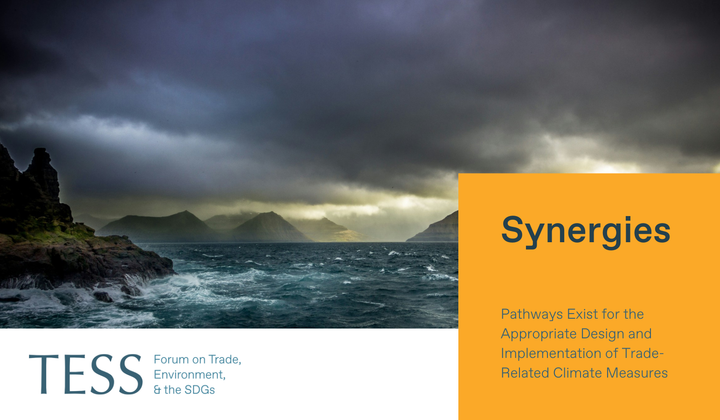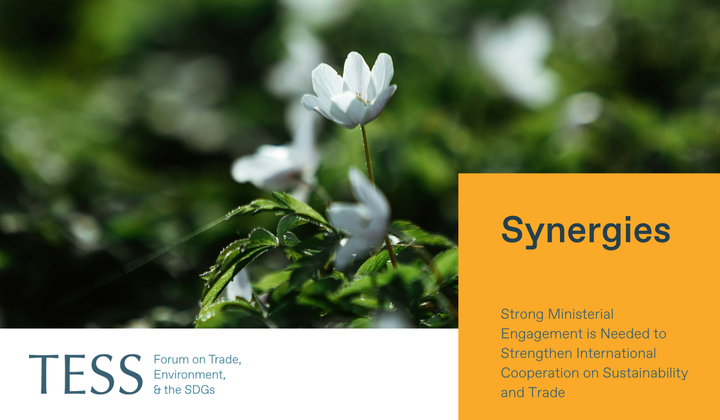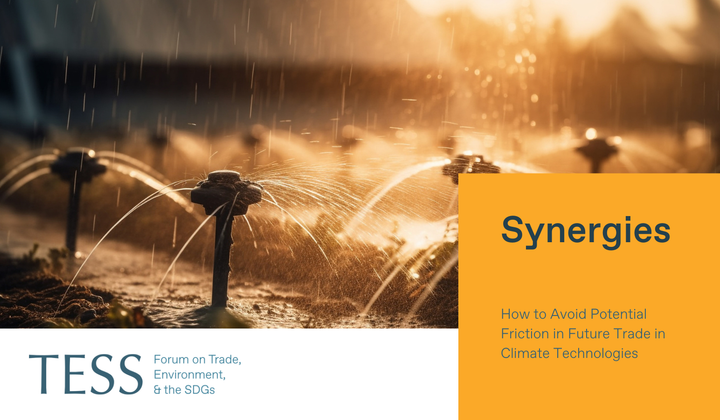In reaction to fundamental shifts in consumer demand, policy, and regulation, will the trade regime conclude that a major redesign is needed—one that takes the WTO’s preambular commitment to sustainable development seriously and places the trade regime at the service of a healthy, balanced, and equitable planetary community?
This article is part of a Synergies series on reviving multilateralism curated by TESS titled From Vision to Action on Trade and Sustainability at the WTO. Any views and opinions expressed are those of the author(s) and do not necessarily reflect those of TESS or any of its partner organizations or funders.
-----
Imagine for a moment—if only for the sake of argument—that stabilizing the climate and reversing the loss of biodiversity were to become the dominant imperative of our time before which all other priorities pale. How would an observer looking at the multilateral trade regime evaluate its fitness for purpose? Would that observer conclude that the system needs deep reform or that both climate and nature priorities can be addressed using the existing rules, without the need for trade discrimination?
This hypothetical is not a reflection of the current situation, but it is not difficult to imagine a scenario in the near-term future in which saving the planet trumps immediate economic interests. In 2023, after all, we briefly hit the 1.5 degrees warming threshold; and, despite decades of solemn goal setting, biodiversity loss has not been stemmed much less reversed. So, it is no longer wildly implausible to believe that such a deep shift of public priorities could become a reality.
Critiques of the Trade Regime
There are precedents for such speculative critiques of the trade regime. In 2001, Professor Dani Rodrik of Harvard University wrote a report for UNDP entitled The Governance of Trade as if Development Really Mattered. In it, he asks what the trading system would look like if its single purpose were to help the poorer countries surmount poverty. The answer, not surprisingly, is that it would look very different. It is not that one cannot imagine how countries might grow and prosper through the judicious application of the present trade rules, and many have. Further, it is recognized that development success in the poorer countries rests on many factors beyond access to world markets for their goods and services. But the paper makes clear that the devotion to raising the living standards of all countries—expressed in the Preamble to the Marrakech Agreement Establishing the World Trade Organization (WTO)—has been overwhelmed by a wish to maximize trade. Trade, intended to be a means to an end, has become an end in itself.
The devotion to raising the living standards of all countries—expressed in the Preamble to the Marrakech Agreement Establishing the World Trade Organization—has been overwhelmed by a wish to maximize trade.
In 2004, Aaron Cosbey at the International Institute for Sustainable Development (IISD) wrote a paper applying Amartya Sen’s “capabilities approach” to trade and sustainable development. Starting from the basic premise that sustainable development is the appropriate goal of trade and investment policies, he asks what the role of the trade regime and of trade policy might be if these were truly in the service of sustainable development. Again, the answer is that they would look very different.
Triggers of Fundamental Change
Both exercises were speculative, musings on the deep differences between the objectives set out in the WTO Preamble and the reality of the trade system’s current functioning. They remained musings because the poorer countries could not establish poverty alleviation as the defining goal of the trade regime, just as sustainable development has—despite the solemn adoption of the Sustainable Development Goals—remained largely aspirational, disconnected from any genuine system of compliance and accountability. It is a “would be nice” rather than a “must have”. Even where there is movement—like the European Union’s Carbon Border Adjustment Mechanism (CBAM)—we are far from working out how to avoid penalizing carbon-intensive developing countries and thereby provoking geopolitical ruptures.
Even the looming threat of irreversible and catastrophic planetary change has not yet proved sufficient to trigger a fundamental re-evaluation of our economic system, but maybe it is not far off? Let us imagine that the imperative of avoiding disaster is so acute that politics moves to shut down or restructure all economic activity that undermines the climate and nature as well as equity within and among nations. We can imagine a world in which all economic and financial activity will be obliged to demonstrate that it generates net-zero carbon and nature-positive outcomes, and that it narrows gaps in social justice and equity.
Sustainable development has remained largely aspirational, disconnected from any genuine system of compliance and accountability.
Robust and enforceable net-zero standards are not far off. Close behind is the articulation of what nature-positive outcomes would look like in practice. And serious attention is beginning to be paid on addressing the “S” in ESG, including robust work on the just transition. Sustainability-related standards are increasingly applied to corporate and financial activity, especially within the European Union. These standards are accompanied by ancillary obligations, such as the due diligence policies that require UK corporations to certify that their value chains are “deforestation free”. Courts around the world are recognizing rights of nature or the right to a stable climate, and litigation around climate and nature is spreading. How close might we be to serious tipping points?
Fundamental change happens in the same way that, in the jocular description, small businesses fail—first slowly, then very quickly! If we manage to stave off global catastrophe, this will necessarily have resulted from a deep shift in what is regarded as acceptable behaviour, especially the behaviour of financial actors and corporations, leading to a large-scale shift in consumer demand, policy, and regulation.
A Major Redesign of the Trade Regime?
How might the trade regime react to such changes (already partially anticipated in CBAM)? Will it dig in its heels and insist that defence of public interest in the form of robust climate and nature action respect the present (binding and enforceable) rules? Or will it conclude that a major redesign is needed—one that takes the WTO’s preambular commitment to sustainable development seriously and places the trade regime at the service of a healthy, balanced, and equitable planetary community?
The debates at the WTO’s Thirteenth Ministerial Conference underlined once again just how difficult it is for the membership to advance on anything of real importance at a pace and scale that genuinely impacts the problem being addressed. Maybe developing a set of scenarios on how the trade regime might be repurposed, as suggested in this article, might breathe welcome life into a system.
-----
Mark Halle is Senior Advisor at NatureFinance.
-----
Synergies by TESS is a blog dedicated to promoting inclusive policy dialogue at the intersection of trade, environment, and sustainable development, drawing on perspectives from a range of experts from around the globe. The editor is Fabrice Lehmann.
Disclaimer
Any views and opinions expressed on Synergies are those of the author(s) and do not necessarily reflect those of TESS or any of its partner organizations or funders.
License
All of the content on Synergies is licensed under a Creative Commons Attribution-NonCommercial-ShareAlike 4.0 International (CC BY-NC-SA 4.0)
license. This means you are welcome to adapt, copy, and share it on your platforms with attribution to the source and author(s), but not for commercial purposes. You must also share it under the same CC BY-NC-SA 4.0 license.
If you would like to reuse any material published here or if you have any other question related to Synergies, send an email to fabrice.lehmann@graduateinstitute.ch.




